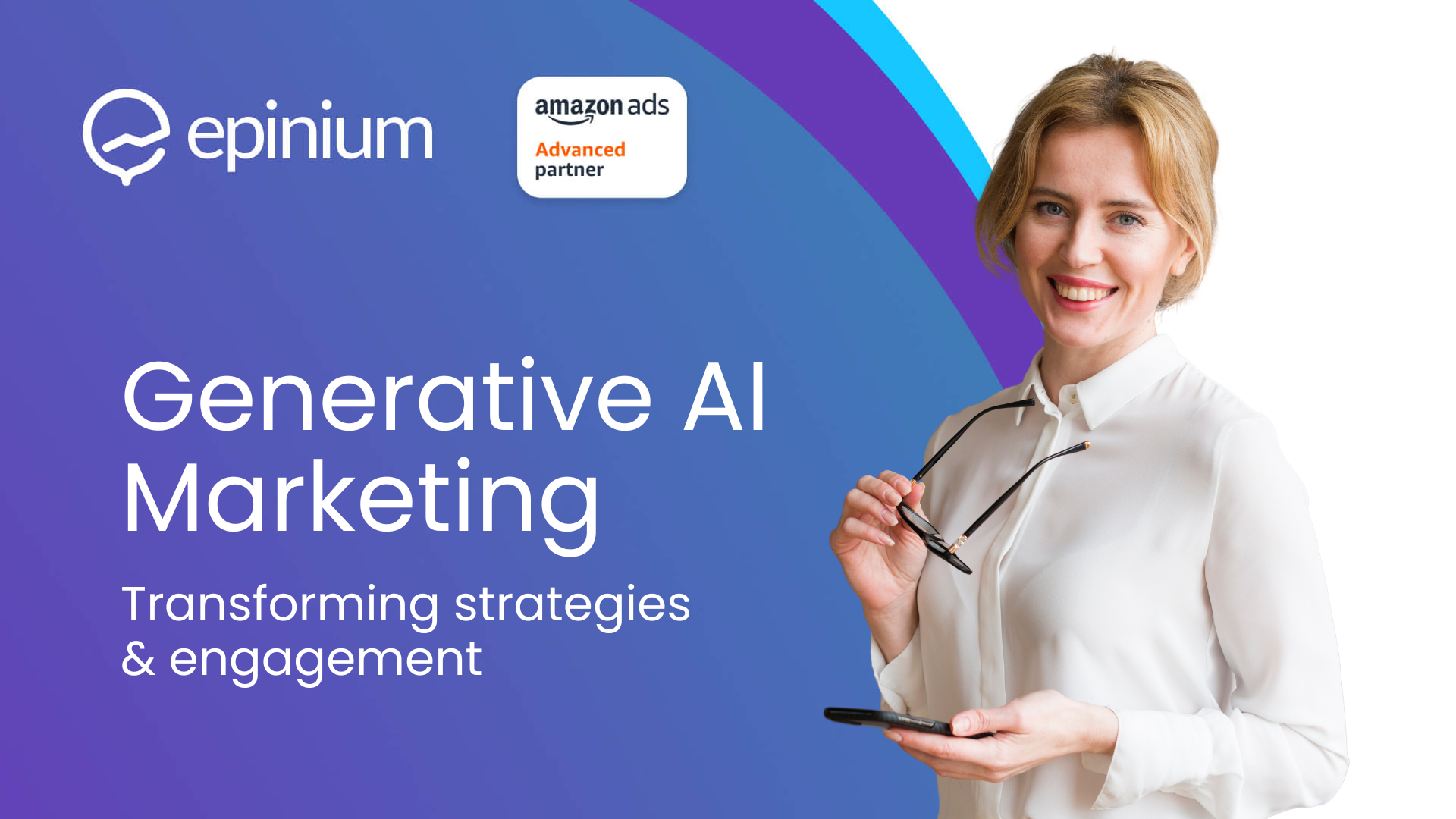Generative AI is transforming the marketing landscape, offering unprecedented capabilities to enhance personalization, content creation, and customer insights. By leveraging advanced algorithms, marketers can create more targeted and effective campaigns, ultimately driving better engagement and higher conversions.
What is generative AI and why is it important for marketing?
Generative AI is revolutionizing the marketing landscape for Amazon sellers, brands, and businesses. This powerful technology enables the creation of highly personalized content, enhancing customer engagement and driving higher conversions. To fully grasp its potential, let’s dive into its definition, basic workings, and importance in modern marketing.
Definition and basics of generative AI
Generative AI uses advanced algorithms to generate new content based on existing data. Think of it as an intelligent assistant that can create product descriptions, promotional images, and engaging social media posts tailored to your brand.
How it works
- Training: The AI is trained on large datasets to learn patterns and styles.
- Content Generation: After training, it generates new content, whether text or visuals, suited to your marketing needs.
- Continuous Improvement: Through feedback, the AI refines its outputs to better match your brand’s voice and customer preferences.
Key Characteristics
- Content Creation: Produces various types of content efficiently.
- Data Analysis: Identifies patterns and trends from extensive datasets.
- Automation: Reduces manual effort in content creation, saving time and resources.
Importance in Modern Marketing
Generative AI is a crucial tool for modern marketing strategies, especially for those selling on platforms like Amazon. It offers scalability, efficiency, and enhanced engagement, making it an invaluable asset.
Benefits for Marketing
- Scalability: Generate large volumes of personalized content quickly, ideal for businesses with extensive product catalogs.
- Efficiency: Automate repetitive content creation tasks, freeing up time for strategic planning and creative work.
- Enhanced Engagement: Create tailored experiences that resonate with individual customers, leading to higher engagement and conversion rates.
By leveraging generative AI, businesses can stay competitive, delivering innovative and effective marketing strategies that capture and retain customer interest. This technology not only streamlines operations but also ensures that marketing efforts are both impactful and personalized.
Key Benefits of Generative AI in Marketing
Generative AI offers numerous advantages that can significantly enhance marketing strategies. For Amazon sellers, brands, and businesses, these benefits translate into better customer engagement, more efficient operations, and improved marketing outcomes. Let’s explore the key benefits in detail.
Enhancing Personalization
Generative AI excels at creating personalized content that resonates with individual customers. By analyzing data such as purchase history, browsing behavior, and customer preferences, AI can craft marketing messages that feel uniquely tailored to each recipient.
Benefits
- Increased Relevance: Personalized content is more likely to catch the attention of customers and encourage engagement.
- Higher Conversion Rates: Tailored messages can drive higher conversion rates as they address the specific needs and interests of customers.
- Customer Loyalty: Personalization fosters a sense of connection and loyalty, encouraging repeat business.
Boosting Content Creation
Creating high-quality content is time-consuming, but generative AI can automate this process, producing a wide variety of content types quickly and efficiently. This includes product descriptions, social media posts, and even video scripts.
Benefits
- Time Efficiency: Automate repetitive content creation tasks, allowing your team to focus on strategic initiatives.
- Consistency: Ensure that all content maintains a consistent tone and style, reinforcing brand identity.
- Volume: Generate large volumes of content to keep up with the demands of multiple platforms and channels.
Improving Customer Insights
Generative AI can analyze vast amounts of customer data to uncover valuable insights. This information helps marketers understand customer behavior, preferences, and trends, enabling more informed decision-making.
Benefits
- Data-Driven Decisions: Use insights to guide marketing strategies and campaigns, ensuring they are based on accurate and up-to-date information.
- Targeted Marketing: Identify specific customer segments and tailor campaigns to meet their unique needs.
- Predictive Analytics: Anticipate future trends and customer behaviors, allowing proactive and strategic planning.
By integrating generative AI into your marketing efforts, you can enhance personalization, boost content creation, and gain deeper customer insights. These benefits not only streamline your operations but also make your marketing more effective and impactful, driving better results and fostering stronger customer relationships.
Applications of Generative AI in Marketing
Generative AI is revolutionizing the way businesses approach marketing, providing innovative solutions for personalizing campaigns, generating content, and analyzing customer data. Let’s delve into the practical applications of generative AI in marketing.
How Does Generative AI Personalize Marketing Campaigns?
Generative AI can tailor marketing messages to individual customers by analyzing their behavior, preferences, and past interactions. This ensures that each customer receives content that is highly relevant and engaging.
Applications
- Email Marketing: Crafting personalized email campaigns that address specific customer needs.
- Product Recommendations: Suggesting products based on individual browsing and purchase history.
- Ad Targeting: Creating customized advertisements that resonate with different customer segments.
Can Generative AI Help in Content Generation?
Generative AI significantly enhances content creation by automating the process and ensuring high-quality outputs. This includes writing product descriptions, creating social media posts, and even developing blog content.
Applications
- Product Descriptions: Generating detailed and engaging product descriptions for Amazon listings.
- Social Media: Creating posts that are tailored to various platforms and audiences.
- Blog Content: Developing well-researched and relevant blog articles to drive traffic and engagement.
What Role Does Generative AI Play in Analyzing Customer Data?
Generative AI can analyze vast datasets to provide deeper insights into customer behavior, preferences, and trends. This analysis helps marketers make data-driven decisions and tailor their strategies more effectively.
Applications
- Customer Segmentation: Identifying distinct customer groups and tailoring marketing efforts to each segment.
- Trend Analysis: Predicting future trends based on historical data and current market dynamics.
- Behavioral Insights: Understanding how customers interact with products and content, allowing for more precise targeting.
By leveraging these applications, businesses can enhance their marketing efforts, making them more personalized, efficient, and data-driven. Generative AI not only streamlines processes but also ensures that marketing strategies are more effective and impactful.
Real-World Examples of Generative AI in Marketing
Generative AI is already making a significant impact in various marketing applications. Here are some real-world examples that illustrate its potential.
Case Study: Personalizing Email Campaigns
Generative AI can craft personalized email content tailored to individual customer preferences and behaviors. By analyzing customer data, AI generates email copy that speaks directly to the recipient’s interests, leading to higher open and conversion rates.
Example
A retail brand used generative AI to personalize email campaigns, resulting in a 30% increase in open rates and a 20% boost in sales.
Case Study: Automated Customer Support
AI-driven chatbots can provide instant, automated customer support, handling common queries and issues efficiently. This not only improves customer satisfaction but also frees up human agents to tackle more complex problems.
Example
An e-commerce company implemented an AI chatbot to manage customer inquiries, reducing response times by 50% and improving overall customer satisfaction scores.
Case Study: Innovation in Product Development
Generative AI can analyze market trends and customer feedback to suggest new product ideas. This helps businesses stay ahead of the curve and develop products that meet current consumer demands.
Example
A fashion brand used AI to analyze social media trends, leading to the creation of a new clothing line that became an instant hit with their target audience.
Challenges and Considerations
While generative AI offers numerous benefits, it also comes with challenges that businesses need to consider.
What are the Potential Risks of Using Generative AI in Marketing?
Generative AI can sometimes produce biased or inaccurate content if the underlying data is flawed. Additionally, over-reliance on automation might reduce the human touch in customer interactions.
Key Risks
- Bias in AI Outputs: AI can perpetuate biases present in the training data.
- Loss of Human Touch: Over-automation can lead to less personalized customer interactions.
How to Address Data Privacy Concerns?
Ensuring data privacy is crucial when using AI. Businesses must comply with data protection regulations and be transparent about how customer data is used.
Strategies
- Compliance: Adhere to GDPR and other data protection laws.
- Transparency: Clearly communicate data usage policies to customers.
- Data Security: Implement robust security measures to protect customer data.
Future Trends in Generative AI Marketing
The future of generative AI in marketing looks promising, with advancements expected to further enhance its capabilities.
What is the Future of Generative AI in Marketing?
Generative AI will likely become more sophisticated, with improved capabilities for real-time personalization and predictive analytics. This will enable even more precise targeting and engagement strategies.
Predicted Trends
- Real-Time Personalization: AI will deliver highly personalized experiences instantly.
- Predictive Analytics: Better predictions of consumer behavior and market trends.
How Can Businesses Prepare for the Future?
To stay ahead, businesses should invest in AI technologies, continuously train their teams, and stay updated with the latest AI developments.
Preparation Strategies
- Invest in Technology: Allocate resources for AI tools and infrastructure.
- Continuous Learning: Train staff on the latest AI techniques and applications.
- Stay Informed: Keep up with emerging trends and advancements in AI.
By understanding these applications, challenges, and future trends, businesses can effectively integrate generative AI into their marketing strategies, driving innovation and improving customer engagement.
Conclusion
Generative AI is revolutionizing marketing by enhancing personalization, boosting content creation, and providing deeper customer insights. By embracing this technology, businesses can stay ahead of the competition and deliver exceptional customer experiences.






